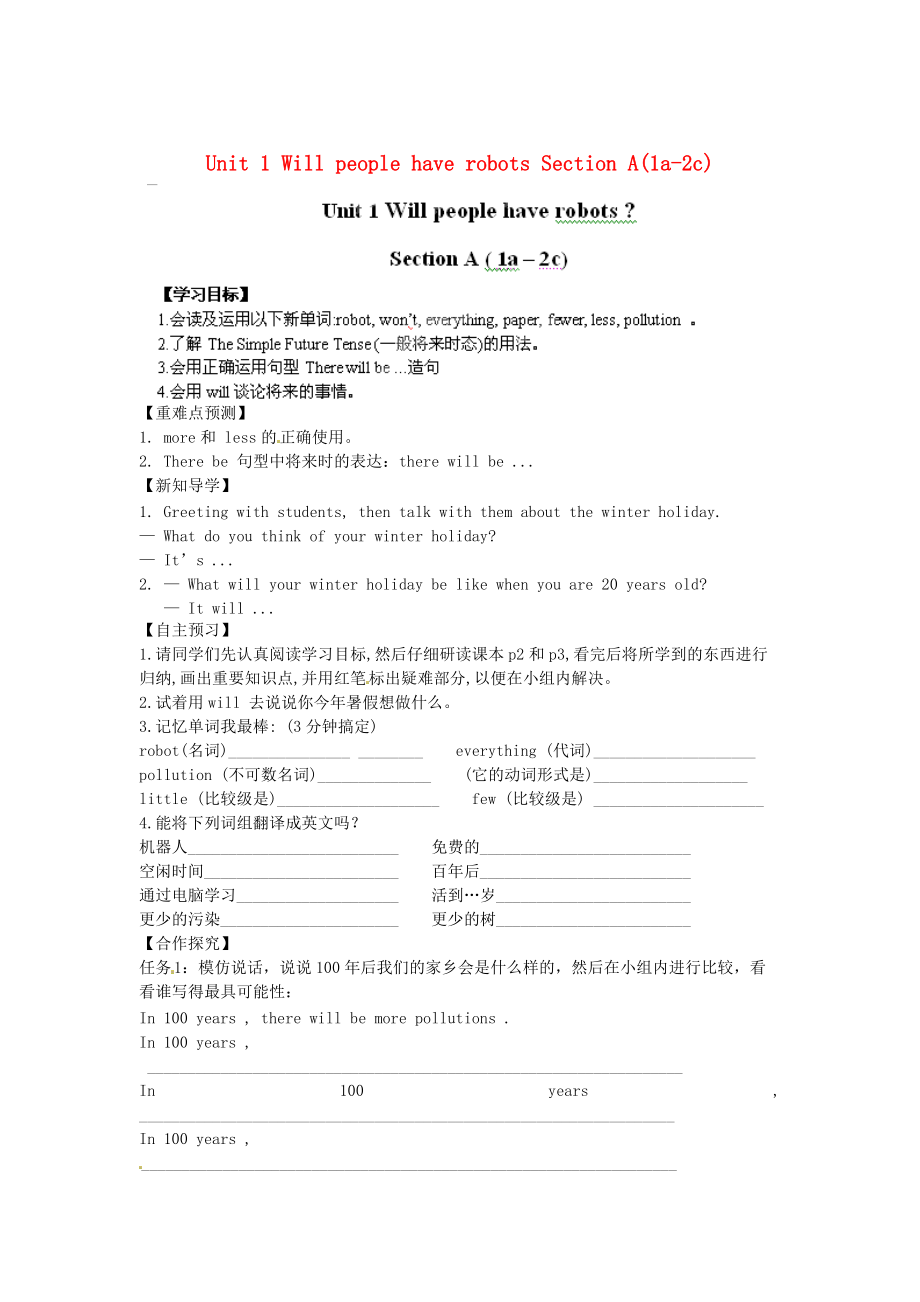《江西省八年級(jí)英語下冊(cè) Unit 1 Will people have robots Section A(1a2c)導(dǎo)學(xué)案 人教新目標(biāo)版》由會(huì)員分享,可在線閱讀���,更多相關(guān)《江西省八年級(jí)英語下冊(cè) Unit 1 Will people have robots Section A(1a2c)導(dǎo)學(xué)案 人教新目標(biāo)版(3頁珍藏版)》請(qǐng)?jiān)谘b配圖網(wǎng)上搜索����。
1���、 精品資料
Unit 1 Will people have robots Section A(1a-2c)
【重難點(diǎn)預(yù)測(cè)】
1. more和 less的正確使用。
2. There be 句型中將來時(shí)的表達(dá):there will be ...
【新知導(dǎo)學(xué)】
1. Greeting with students, then talk with them about the winter holiday.
— What do you think of your winter holiday?
— It’s ...
2.
2���、— What will your winter holiday be like when you are 20 years old?
— It will ...
【自主預(yù)習(xí)】
1.請(qǐng)同學(xué)們先認(rèn)真閱讀學(xué)習(xí)目標(biāo),然后仔細(xì)研讀課本p2和p3,看完后將所學(xué)到的東西進(jìn)行歸納,畫出重要知識(shí)點(diǎn),并用紅筆標(biāo)出疑難部分,以便在小組內(nèi)解決�。
2.試著用will 去說說你今年暑假想做什么�����。
3.記憶單詞我最棒: (3分鐘搞定)
robot(名詞)_______________ ________ everything (代詞)____________________
pollution (不
3���、可數(shù)名詞)______________ (它的動(dòng)詞形式是)___________________
little (比較級(jí)是)____________________ few (比較級(jí)是) _____________________
4.能將下列詞組翻譯成英文嗎���?
機(jī)器人__________________________ 免費(fèi)的__________________________
空閑時(shí)間________________________ 百年后__________________________
通過
4�����、電腦學(xué)習(xí)____________________ 活到…歲________________________
更少的污染______________________ 更少的樹________________________
【合作探究】
任務(wù)1:模仿說話���,說說100年后我們的家鄉(xiāng)會(huì)是什么樣的,然后在小組內(nèi)進(jìn)行比較�����,看看誰寫得最具可能性:
In 100 years , there will be more pollutions .
In 100 years ,
________________________________________________________
5�����、__________
In 100 years , __________________________________________________________________
In 100 years ,
__________________________________________________________________
任務(wù)2:先練熟1C的對(duì)話�,再模仿說自己的。
A: Will people use money in 100 years?
B: NO, they won’t. Everything will be free.
Will peop
6�����、le live to be 200 years old?
A: Yes, they will.
任務(wù)3:再練2C的對(duì)話��,再用There will be 談自己對(duì)將來的預(yù)測(cè)。
A:I think there will be more pollution.
B: I don’t agree. But I think there will be fewer trees.
A: I agree.
考點(diǎn)聚焦
◆一般將來時(shí):表示將來某個(gè)時(shí)間要發(fā)生的動(dòng)作或存在的狀態(tài)�。
常見的形式有:will +V原
be goin
7、g to +V原
be to +V原
有時(shí)也會(huì)用現(xiàn)在進(jìn)行時(shí)be +Ving 來表示將來的計(jì)劃�����,打算���。
時(shí)間狀語:一般有tomorrow, the day after tomorrow, from now on, soon, next +時(shí)間點(diǎn)�����,in +時(shí)間段等���。
練一練:選擇正確答案
( ) 1. I _____ my aunt and uncle tonight.
A. will visit B. am visiting C. visit D. both A and B
◆less 和fewer
less 和f
8、ewer都是比較級(jí)形式, less修飾不可數(shù)名詞, fewer修飾可數(shù)名詞���。
練一練:請(qǐng)用less 和fewer完成下列句子
1. I hope the pollution will be _____ and _____.
2. There are _____ trees on the hill because many people cut them down .
3. Now , I have ______ money in my pocket .
【學(xué)案整理】
9、
Unit 1 Will people have robots ?
Section A ( 1a – 2c)
練一練:D
練一練:1. less less 2. fewer 3. less
 江西省八年級(jí)英語下冊(cè) Unit 1 Will people have robots Section A(1a2c)導(dǎo)學(xué)案 人教新目標(biāo)版
江西省八年級(jí)英語下冊(cè) Unit 1 Will people have robots Section A(1a2c)導(dǎo)學(xué)案 人教新目標(biāo)版

